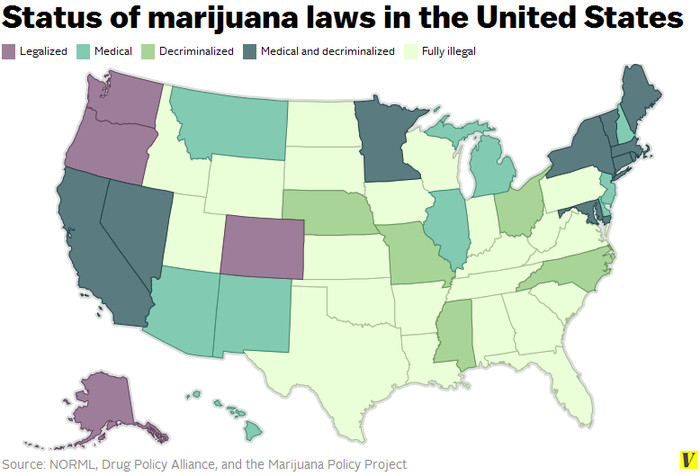2. Ten Years Ago Portugal Decriminalized All Drugs. What Happened Next?
3. Marijuana Laws in the US
4. Colorado - one year after legalization
5. A better way to treate opiate addiction?
"An abstinence-only treatment that may have a higher success rate for alcoholics simply fails opiate addicts. “It’s time for everyone to wake up and accept that abstinence-based treatment only works in under 10 percent of opiate addicts,” Kreek said. “All proper prospective studies have shown that more than 90 percent of opiate addicts in abstinence-based treatment return to opiate abuse within one year.” In her ideal world, doctors would consult with patients and monitor progress to determine whether Suboxone, methadone or some other medical approach stood the best chance of success. "
6. Harm Reduction programs - your thoughts?
HW - "The House I Live In" viewing questions
- Due: 5/19 (Tuesday)
- This assignment will count as a TEST GRADE!
- Paragraphs will be graded on accuracy, thoroughness, effort and how well you support your claims with evidence/details.
- Each question should be answered in a substantial paragraph.
- Your answers should be typed.
- Answers should be in YOUR OWN WORDS - plagiarism will result in a zero on the assignment.
- Click here for a list and short bio for the people featured in the film.
- Click here for a document containing the major stats presented in the film.
- 10 pts/question (70 pts total)
- Late assignments will be deducted 7 pts per week late (one letter grade per week).
1. The film introduces you to lots of different people whose lives intersect with the War on Drugs. Which stories stuck out in your mind as you were watching? Which characters did you feel close to, who did you like? Were there any “good guys” or “bad guys” in this film? Which characters and stories surprised you?
2. Think about
the story of Anthony Johnson and his family. Who were Anthony’s father’s role
models? Who were Anthony’s role models? What challenges does a kid face growing
up with an incarcerated parent? Can you explain how the cycle of drug use, drug
dealing, and incarceration gets passed down through generations? Think about
the way Shanequa Benitez, who grew up in the same housing project as Anthony
Johnson, talked about the practical necessity of selling drugs to get by. Why
do you think it’s so hard for a kid to break free?
3.
Who were the early drug laws designed to target? When did the “War on
Drugs”
begin officially?
4. The film shows footage of politicians
speaking in favor of harsher drug legislation, even though evidence suggests
that harsh laws don’t help the problem. Why are politicians supporting laws
that don’t work?
5.
How has the drug war changed
the role of law enforcement? How
does the pursuit
of drug crimes bring money into police departments? What negative impact does
this have on non- narcotic police operations? How has the drug war changed the
relationship between police and the community?
6.
Were you surprised by the statistics in the film, i.e. to learn that the US has
the highest prison population in the world? The film talks a lot about what’s
wrong with the system, but it leaves it up to the audience to imagine a
different reality. After watching this film, what would you propose as an
alternative to incarcerating people for addiction and drug-related crimes?
7.
The House I Live In is
a documentary film that makes a provocative statement. Why do you think Eugene
Jarecki made this film? What is the central message and the purpose of the
film? Who is its intended audience? How do you think the filmmaker wants you to
feel after watching?

No comments:
Post a Comment